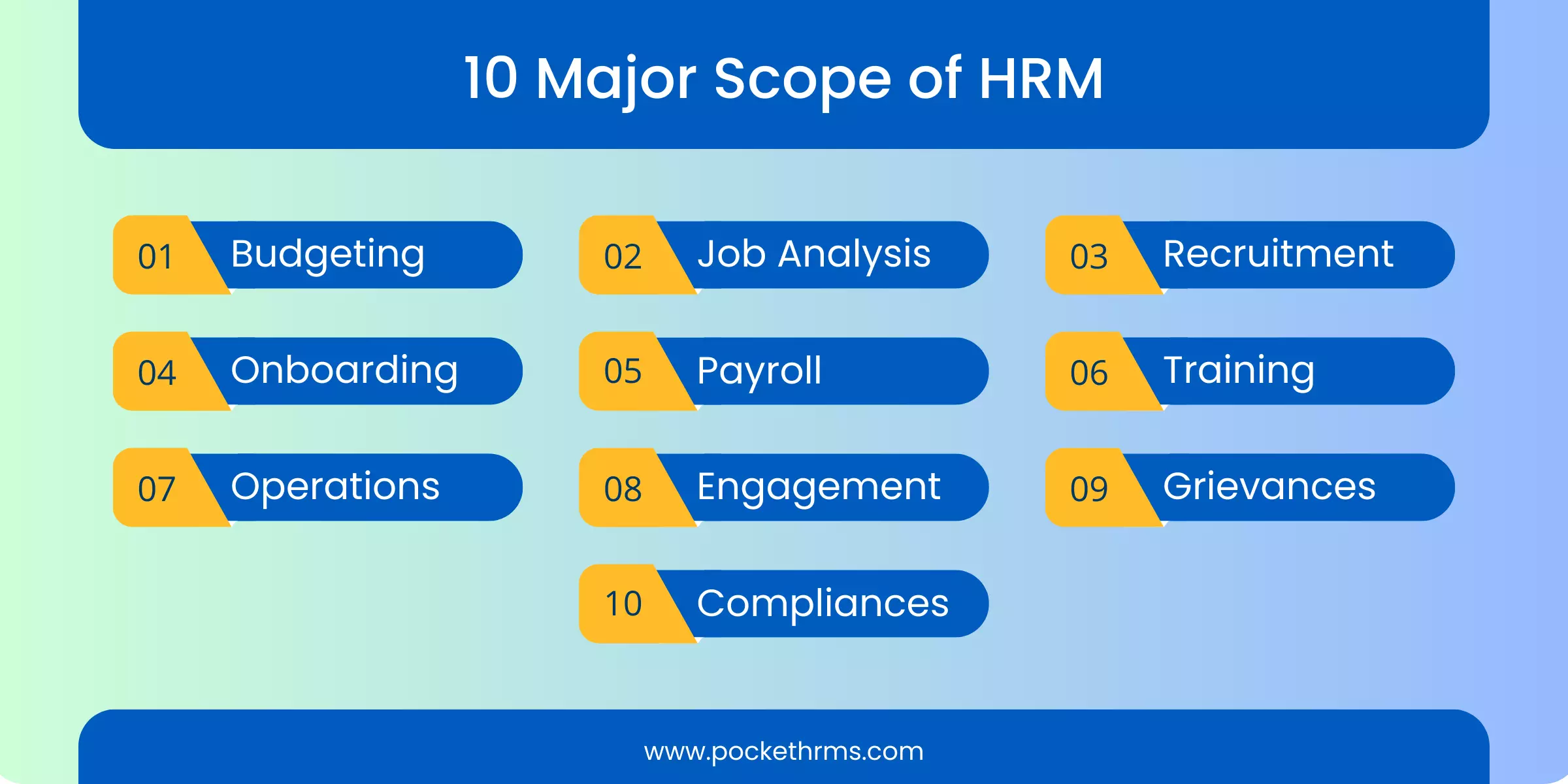Human Resource Management (HRM) is essential for the functioning of any organization. It enables the company to manage its employees effectively. The HR department tackles the tasks related to HRM, and hence, they are vital for the success of any organization.
HRM ensures the creation of jobs and filling those positions with talented staff. It also includes retaining them, as well as providing them with the tools required to undertake their tasks as well as training them to be better at their work.
Since employees are the most valuable asset for any organization, it is essential to undertake employee management with the highest diligence. Hence, we will be checking out the scope of human resource management through 10 significant aspects of employee management.
What is Human Resources Management?
Human Resource Management or HRM refers to the effective management of the staff in an organization. It enables companies to create jobs, recruit candidates for the jobs, as well as train and retain them by providing the necessary training and development program, recognition and rewards, and more.
It also helps with paying their salaries on time, as well as maintaining employee relations. Organizations delegate the task of HRM to the HR department, which is responsible for creating company policies and ensuring its implementation throughout the company.
HRM also covers the alignment of employee goals with the organizational goals, which helps the company actively engage and retain its staff.
What is the Scope of Human Resource Management?
The scope of HRM is very vast and it is constantly evolving according to the changing trends in the industry. While this scope simply included recruitment and selection, and retaining talent until a few years ago, it has expanded to being an essential factor in deciding the organizational goals, implementing precautionary policies for avoiding attrition, actively engaging employees, and more.
While the scope of human resource management is always evolving, there are some basic aspects of HRM which remain constant.
For example, recruitment and selection will always remain a part of HRM, while the way it is undertaken has changed a lot in the past. Hence, the scope of HRM has increased vastly in recent years, leading to its increased relevance in the company.
Also Read:
10 Major Scope of HRM or Human Resources Management
The 10 major scope of HRM includes the following:

- Budgeting
- Job Analysis
- Recruitment
- Onboarding
- Payroll
- Training
- Operations
- Engagement
- Grievances
- Compliances
Let us discuss scope of HRM in each of these aspects of human resource management.
1. Budgeting
Budgeting or planning refers to the process of assessing the company resources and defining the job roles. This process considers the numerous resources available in the company and allocates a budget for each job position, while clearly defining their roles and responsibilities.
Human resource planning also includes the various resources associated with employee management such as manpower planning, training and development, compensation and benefits structure planning, productivity improvements, rewards and recognition, expense management, and more.
HR planning also includes future budget allocations for new jobs and the workforce required to undertake those jobs.
Hence, it efficiently matches the supply and demand of the company’s workload with the staff, ensuring that the work is completed within the prearranged timeframe.
2. Job Analysis
Job analysis and evaluation help the HR team understand the basic construct of a job, such as the basic responsibilities of a specific role, the qualifications and experience required to undertake it, as well as the remuneration to be provided for the work undertaken.
Job analysis also deals with matching the skillset of the candidates for a specific role with the job role, making it easier for the recruiters to employ them. It also considers the finances of the company and allocates adequate resources for each position.
Job analysis also helps in arranging training and development programs for the staff who are placed in a specific position, ensuring long-term retention.
3. Recruitment
Now that we have covered the job analysis process, we need to discuss recruitment and selection as it deals with searching for the right candidate for a job role and recruiting them for a specific role.
It includes posting the jobs on various job boards, both online and offline, after creating the perfect job description to attract the relevant talent.
The scope of human resource management in recruitment and selection also includes interviewing the candidates who respond to the job posting, assigning them tasks for assessing their skills, and providing them with offer letters.
The process also includes freeing the interviewers from their daily tasks to help them conduct the interviews, as well as arranging for any specific requirements from their end.
4. Onboarding
Onboarding and induction also come under the scope of human resource management since it provides the recruit with a clear idea of things to come.
Having a clearly defined onboarding routine enables the HR team to provide the new employee with an overview of the company and their daily roles and responsibilities.
Having a robust onboarding process enables the HR to help the new joiner get acquainted with their new job profile and understand their company better. It also helps them understand the company culture and work ethics.
Additionally, it ensures that the recruit is aware of the company ethos and understands their daily responsibilities well.
5. Payroll
It is a well-established fact that payroll is the primary motivation for most employees to come to work. Hence, payroll management is another aspect of employee management which comes under the scope of human resource management.
It includes various processes related to employee compensation and benefits such as collating the payroll cycle input data, calculating the compensation and benefits based on this data, and disbursing it through the preset methods.
Payroll management also deals with adhering to statutory compliances, which helps the company avoid hefty fines. Once the payroll for an employee is calculated, the HR is required to deduct taxes from it and pay it to the Government.
6. Training
Similarly, the training and development of the employees also fall under the scope of human resource management. Training helps the staff improve their performance since it enhances their skills, making them better at their individual tasks.
For a company, training and development of the staff has the dual advantage of making them better at their work and retaining them for longer with the organization, since they realize their value for their company.
Training and development may also be conducted for existing long-term staff to refresh their skills or provide cross-skilling enhancements. It enables them to stay updated with the latest trends in their respective domains, making them more efficient in their work.
7. Operations
HRM is also responsible for maintaining employee-employer relationships. It involves addressing the employee concerns by providing grievance mechanisms, providing counselling to them, as well as taking disciplinary action in case of malpractices and misbehaviour.
Maintaining amicable relations also extends to the workers’ unions as they represent the body of workers. Such relations ensure that the employees and employers work together to achieve the organizational targets.
Similarly, HR operations also ensure that the management understands the requirements of their staff, while the employees understand their management’s viewpoint in certain scenarios.
For example, HR operations ensure workplace safety as unsafe work conditions should not be tolerated by any worker.
8. Engagement
Keeping the employees engaged also comes under the scope of human resource management. The HR team undertakes various strategies for keeping the employees engaged in the company.
Since engaged employees stay longer with the company and are more productive, it enhances the company’s employer brand and overall success rate. To ensure employee engagement, HRs also take care of their mental well-being, which improves their trust in the company.
Additionally, they also undertake various fun activities to ensure that their staff feel valued and become a contributing member of their team.
Such activities, combined with rewards and recognition, help change the ambience of the workplace to a fun-filled one, which keeps the staff engaged with the organization.
9. Grievances
Another crucial task which comes under the scope of HRM is grievance redressal. When a diverse group of individuals work together, there are bound to be multiple instances of disagreements and differences between them.
If an issue escalates, the HR department must take action and ensure harmony in the workplace. There are specific grievance redressal units created within large enterprises to ensure that a peaceful atmosphere is maintained throughout the company premises.
Even in case of an issue, there are multiple safeguards set up to ensure that it does not escalate beyond a certain point.
10. Compliances
Since organizations are required to follow compliances set by the authorities, the HR team ensures that the employees follow the same. The company is also required to follow various employment-related laws, which again come under the scope of HRM.
Various labour laws and safety regulations require the help of other teams along with the HR department to ensure complete adherence in an organization.
Similarly, the HR team also helps the management avoid legal fines by enabling the company and its employees to work in harmony. By avoiding legal issues, the company and its staff can stay productive to ensure long-term success.
Also Read:
Conclusion
The scope of HRM is wider than what is observable on the surface. While we have discussed the major aspects of the scope of human resource management (HRM) within an organization, there are other factors too which are important for the functioning of a company.
Since the HR department undertakes HRM activities for a company, it is essential to provide them with the tools necessary to undertake their tasks effectively.
Having the right tools helps them allocate the right resources, hire the right personnel, train and upskill them, as well as manage them effectively until their exit from the organization.









